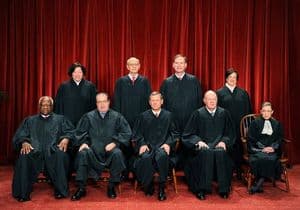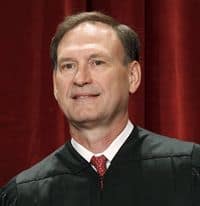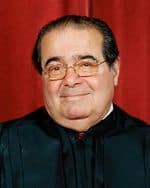 Marriage week continues at the Supreme Court with today's argument on the constitutionality of the Defense of Marriage Act (DOMA). This case raises the question of whether the federal government can refuse to recognize the marriages of gay couples who get married in the states. DOMA Section 3 defines marriage as only between one man and one woman for federal purposes and, therefore, prevents those couples from accessing thousands of federal benefits and obligations attendant to marriage, like joint tax filing and spousal sponsorship visas.
Marriage week continues at the Supreme Court with today's argument on the constitutionality of the Defense of Marriage Act (DOMA). This case raises the question of whether the federal government can refuse to recognize the marriages of gay couples who get married in the states. DOMA Section 3 defines marriage as only between one man and one woman for federal purposes and, therefore, prevents those couples from accessing thousands of federal benefits and obligations attendant to marriage, like joint tax filing and spousal sponsorship visas.
Yesterday, during the long hearing on California's Prop 8, we learned that several justices were concerned about the Prop 8 proponents' right to be there at all (standing). We saw Justice Scalia's insensitive snark, powerful questioning from Justices Kagan and Sotomayor, pointed insight from Justice Ginsburg when she questioned the Prop 8 proponents' attorney, Charles Cooper, and strategic arguments from Ted Olson and Don Verrilli. We also saw Justice Kennedy "struggling" with the issue of marriage discrimination as sex discrimination and Justice Sotomayor pummelling Mr. Cooper with the implications of his discriminatory positions.
 Will we see some of the same concerns raised today? The DOMA case raises its own standing concerns that could get it thrown out, which is why the Court allocated a full 50 minutes just to the standing question. Setting aside so much time to one specific question, however, does not necessarily mean the justices are more focused on standing in DOMA than they were in Prop 8. Rather, because all parties have always agreed that standing was met, the standing question was never fully addressed. Think of the first 50 minutes as the Court's attempt to make sure it gets all sides of the issue, with Harvard Law Professor Vicki Jackson arguing against standing. Then, the Court moved to the merits, which is where it got interesting.
Will we see some of the same concerns raised today? The DOMA case raises its own standing concerns that could get it thrown out, which is why the Court allocated a full 50 minutes just to the standing question. Setting aside so much time to one specific question, however, does not necessarily mean the justices are more focused on standing in DOMA than they were in Prop 8. Rather, because all parties have always agreed that standing was met, the standing question was never fully addressed. Think of the first 50 minutes as the Court's attempt to make sure it gets all sides of the issue, with Harvard Law Professor Vicki Jackson arguing against standing. Then, the Court moved to the merits, which is where it got interesting.
Nothing in the oral arguments made me change my view of Windsor: This case gives conservatives and liberals the opportunity to come together to declare DOMA unconstitutional (starting at 2:37). And, although I think we should be cautious about drawing substantive conclusions based on questioning from judges who often play the devil's advocates, today's argument gave us a few clues about what the justices were thinking:
-
The Court was indeed concerned about standing, but it doesn't appear likely that the Court will toss Windsor on standing or jurisdictional grounds. Justice Ginsburg is always a particularly active questioner on standing issues; she is a former masterful civil procedure professor. Several justices, including those as different as Justices Alito and Kagan, appear on board for jurisdiction.
-
Federalism and equality were at the core of most of the substantive questions about DOMA. Justice Kennedy was particularly concerned about federalism and how DOMA intrudes into the realm of the States. But, don't think that his line of questioning means he is blind to the equality concerns.
-
Justice Alito showed deep skepticism about how DOMA could ever be related to encouraging heterosexuals to get married. That's a telling question from a justice who does not seem to play the devil's advocate a lot.
In short, the argument in Windsor exceeded even Ted Olson's success at the Prop 8 argument. Edie Windsor will win; it is just a matter of how big a win it will be.
AFTER THE JUMP, I summarize some of the highlights of the first part of today's argument and offer some conclusions and analysis. The standing material is a bit arcane, but I did my best to spice it up with some sense of the importance of the issue in the courtroom.
CONTINUED, AFTER THE JUMP…
Professor Jackson struggled mightily, but that didn't stop the justices from criticizing the Executive Branch's moves in this case when questioning her and Sri Srinivasan, attorney for the Government.
 We all knew that a similar case about Congress stepping in to defend a law that the executive branch did no, INS v. Chadha, was going to get a lot of play. In that case, there was standing. The law at issue in Chadha gave Congress the power to override an INS decision to deport someone. The administration at the time believed the law to be an unconstitutional violation of Executive powers and refused to defend the law. The Court said that Congress could step in because the power to override the INS was an explicit prerogative of Congress; Congress has standing to defend itself. But there are important differences between Chadha and the situation that brought House Republicans to DOMA's defense. First, Chadha involved both the House and the Senate stepping in, and, second, both had passed explicit resolutions authorizing their participation. Neither of those facts are present here: In Windsor, there was neither specific authorization nor were both houses involved. Plus, representing the House to defend DOMA is not part of the Bipartisan Legal Advisory Group (BLAG)'s explicit rules.
We all knew that a similar case about Congress stepping in to defend a law that the executive branch did no, INS v. Chadha, was going to get a lot of play. In that case, there was standing. The law at issue in Chadha gave Congress the power to override an INS decision to deport someone. The administration at the time believed the law to be an unconstitutional violation of Executive powers and refused to defend the law. The Court said that Congress could step in because the power to override the INS was an explicit prerogative of Congress; Congress has standing to defend itself. But there are important differences between Chadha and the situation that brought House Republicans to DOMA's defense. First, Chadha involved both the House and the Senate stepping in, and, second, both had passed explicit resolutions authorizing their participation. Neither of those facts are present here: In Windsor, there was neither specific authorization nor were both houses involved. Plus, representing the House to defend DOMA is not part of the Bipartisan Legal Advisory Group (BLAG)'s explicit rules.
But, several justices spent more time taking shots at the Administration's procedural moves — continuing to enforce a law, yet thinking it unconstitutional, and asking for the Supreme Court to decide the question — rather than asking nuanced questions about the law. The Chief Justice stated that the Administration lacked "courage" by punting the question to the Court. If you listen to the audio, you can hear the always-professional and cerebral Chief raise his voice in the manner used to respond to a disrespectful child. Even Professor Jackson, who argued that there is no jurisdiction in this case, pushed back against the Chief's implication.
 Justice Alito, who, if these cases are any indication, does not like to play the devil's advocate, shot down Professor Jackson's suggestion that the Administration had no ability to appeal. It still owes Edie Windsor $350,000. Justice Kagan asked several questions on this point, as well. The Administration needs the Supreme Court to determine the status of DOMA.
Justice Alito, who, if these cases are any indication, does not like to play the devil's advocate, shot down Professor Jackson's suggestion that the Administration had no ability to appeal. It still owes Edie Windsor $350,000. Justice Kagan asked several questions on this point, as well. The Administration needs the Supreme Court to determine the status of DOMA.
Justice Sotomayor, though, got to the real problem with throwing this case out on standing: How is the next case going to be any different? If you don't let the federal government, who is the party on the hook for Ms. Windsor's (and everyone else's) federal tax bill, then there will never be standing to appeal a lower court's ruling declaring DOMA unconstitutional. And, that's exactly right. Given the unique procedural maneuvers in this case, you could never get an anti-DOMA ruling up to the Court; you'd have to wait for DOMA to be upheld, which is never going to happen.
In the end, Professor Jackson did her best in a tough environment, often prefacing her answers with "That's a difficult question…" or something of that sort. But, her fellow advocates faced intense questioning, as well.
 Sri Srinivasan spent almost his entire time swatting back criticisms from Justice Scalia and others about the Administration's unique procedure in this case. He kept returning to the argument that it doesn't matter if the House has standing because the Administration still had the power to appeal, as it was, and is, enforcing DOMA. The questioning here struck me as venting: the conservatives on the Court were a little peeved that the Administration decided not to defend DOMA, but since there is nothing illegal about that and nothing about the procedure it used that would deprive the Court of jurisdiction, the justices decided to show their disapproval with vociferous questioning. Don't let the "hot bench" Mr. Srinivasan faced persuade you that Windsor will be tossed on jurisdictional grounds.
Sri Srinivasan spent almost his entire time swatting back criticisms from Justice Scalia and others about the Administration's unique procedure in this case. He kept returning to the argument that it doesn't matter if the House has standing because the Administration still had the power to appeal, as it was, and is, enforcing DOMA. The questioning here struck me as venting: the conservatives on the Court were a little peeved that the Administration decided not to defend DOMA, but since there is nothing illegal about that and nothing about the procedure it used that would deprive the Court of jurisdiction, the justices decided to show their disapproval with vociferous questioning. Don't let the "hot bench" Mr. Srinivasan faced persuade you that Windsor will be tossed on jurisdictional grounds.
When Paul Clement, the attorney for House Republicans, got up to talk standing, the questioning turned in earnest to the implications of Chadha. In Chadha, the key was that a specific power of Congress — overriding an INS deportation decision — was at stake, giving Congress standing. Here, Congress's only interest is the generalized interest in seeing laws it passes enforced. That's a powerful, important argument.
 Justice Scalia returned again and again to the trope that "Congress passes the laws and the Executive enforces" them and that enacting laws would be meaningless if a president coulds simply say no to defending those laws. He (and the Chief Justice) also said that what the Administration did in this case was "unprecedented." Let's be clear: not defending a law is not unprecedented; defending it, then switching sides, winning, then asking the Court to give a decision anyway, is indeed unprecedented. But, the mere fact that it's unprecedented is not the point. We have to ask if this process, however unprecedented it might be, still deprives the Court of jurisdiction to hear the case. Scalia missed that, intentionally or unintentionally; several other justices realized this.
Justice Scalia returned again and again to the trope that "Congress passes the laws and the Executive enforces" them and that enacting laws would be meaningless if a president coulds simply say no to defending those laws. He (and the Chief Justice) also said that what the Administration did in this case was "unprecedented." Let's be clear: not defending a law is not unprecedented; defending it, then switching sides, winning, then asking the Court to give a decision anyway, is indeed unprecedented. But, the mere fact that it's unprecedented is not the point. We have to ask if this process, however unprecedented it might be, still deprives the Court of jurisdiction to hear the case. Scalia missed that, intentionally or unintentionally; several other justices realized this.
Toward the end of the procedural section of today's argument, Justice Alito asked about the fact that the House is trying to defend DOMA without the Senate. This puts together the whole package of questions we expected would be asked, with the justices pestering all sides.
If we can take anything away from the standing line of questions is that it stands in sharp contrast to the jurisdiction line of questions in the Obamacare case. If you recall, there was a question as to whether the Court could even hear a case challenging the constitutionality of the Affordable Care Act because nothing had happened yet to spark a case. The Court's questioning in that case showed that nearly all of the justices were skeptical of a no-jurisdiction argument. Here, we see some skepticism, but most of it was simply critical of the Administration's behavior, not showing clear doubts about the Court's ability to hear the case. I caution making too much of the hot bench, though. In the health care case, jurisdiction was a slam dunk; here, it's just a closer call.
PART 2, COMING SHORTLY….
***
Ari Ezra Waldman teaches at Brooklyn Law School and is concurrently getting his PhD at Columbia University in New York City. He is a 2002 graduate of Harvard College and a 2005 graduate of Harvard Law School. His research focuses on technology, privacy, speech, and gay rights. Ari will be writing weekly posts on law and various LGBT issues. You can follow him on Twitter at @ariezrawaldman.



